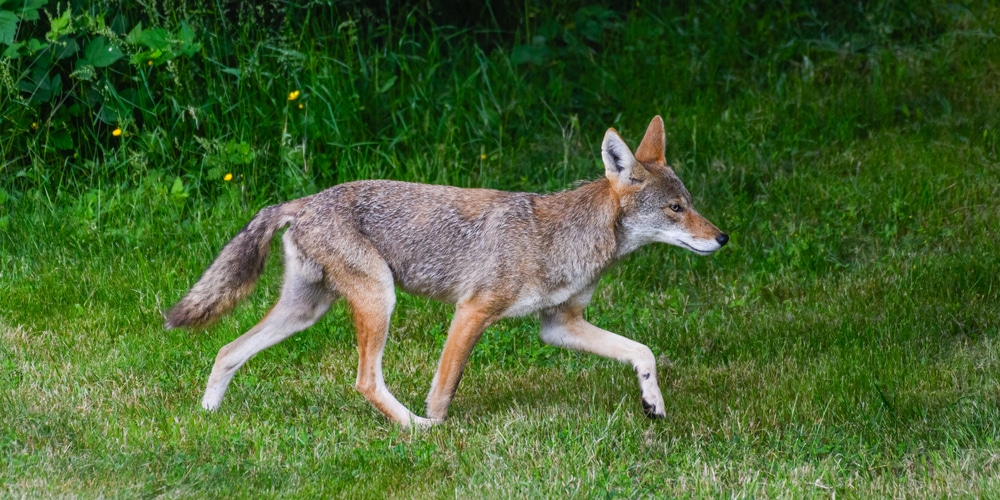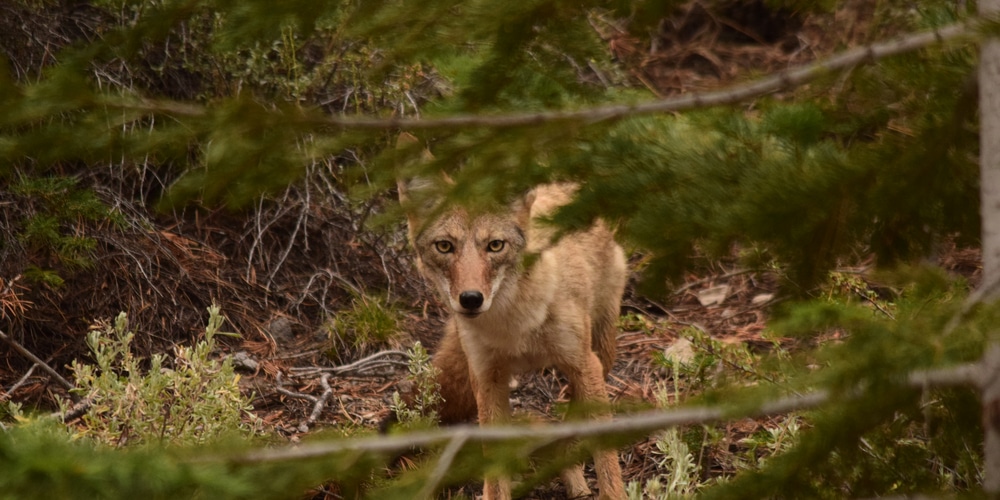To answer the above question, wolves eat coyotes. The wolf is significantly more enormous than the coyote. Coyotes only weigh 15-50 pounds while wolves weigh 70-150 pounds. Due to the wolf’s weight, it can pin down a coyote.
Also, wolves are able to hunt down coyotes since they move in packs. So, a coyote may have to try to escape from ten wolves. Remember, a wolf is already stronger than the coyote, so how would you expect it to face ten wolves?
Now that we know what makes wolves more powerful than coyotes, it is time to find out why they eat them. We will also discuss why wolves are sometimes unable to hunt down coyotes.
Wolves Eat Coyotes to Survive
Wolves are a bit picky when it comes to their prey. Wolves generally prefer to hunt large hoofed mammals like elks, deer and bison. However, they also hunt down smaller mammals like rodents.
As for coyotes, wolves only eat them when there is a shortage of prey. For the most part, wolves can coexist with coyotes as long as there is an endless food supply. So, it is rare for wolves to eat coyotes.
Also, wolves may hunt down coyotes to prevent their cubs from going hungry. Since the cubs cannot hunt for themselves, the wolf is forced to hunt a coyote. Again, this is a case where there is food shortage.
Wolves Eat Coyotes During a Violent Fight
Apart from hunting, there is a significant role packs play. Wolves stay in packs to protect themselves from animals they may perceive as prey. Although coyotes may not hunt down a wolf, they may eat their cubs.
The wolves will attack a coyote approaching their cubs. There is a strong chance of a coyote being killed by a pack of wolves. Once the wolves kill the coyote, they may eat it. However, wolves prefer to scare off coyotes. Interestingly, a wolf may hunt down a coyote and not eat it.
Another incident that can trigger fights between wolves and coyotes is when a wolf catches prey. Coyotes sometimes snatch prey from wolves. That is enough to cause a violent fight between them.
So, if the wolf runs after a coyote and catches it, it may attack it and eat it. However, in most instances, the wolf prefers to scare it off instead.
Why Wolves Do not Eat Coyotes Often
Wolves are intelligent predators. For instance, they know the dangers of hunting another predator. When a wolf hunts down a coyote, the coyote will put up a fight.
In fact, coyotes can also kill wolves during a violent fight. The last thing a wolf would want is to hunt an animal that will fight back. That is why they prefer to hunt down herbivores since they rarely fight back.
Wolves also do not like hunting coyotes due to their fast speed. They run at 38 mph while coyotes run at 43 mph. Therefore, a wolf will do what it can to spend less energy by not chasing after an animal it may not catch.
Additionally, the wolf considers the amount of energy it gets from eating certain prey. Energy is crucial in the wild since it helps animals hunt down prey or escape from predators.
So, to get maximum energy, the wolf will instead hunt down herbivores. Herbivores get energy by eating plants. When a wolf eats an herbivore, it indirectly gets energy from the plant but at only 10%.
This energy is too low, so the wolf will not use the little energy it has to hunt a coyote. Remember, coyotes are very fast, which means the wolf will need a lot of energy to hunt it.
Another reason a wolf may not hunt a coyote is that they are not entirely carnivorous. They have omnivorous traits in them, just like house dogs. That means they can eat some plants and fruits.
Since they are readily available and cannot run, why would it waste its energy chasing after a coyote? The reason wolves can survive on herbivore diets is that they easily adapt to their surroundings. That explains why they have been around for the last 60 million years.
Do Wolves Eat Coyotes?: Conclusion
Wolves and coyotes have a complicated relationship. The coyote has to do what it can to avoid getting eaten by wolves.
For instance, they should not approach a wolf’s territory or snatch prey from it. As long as the coyote hunts its prey from a distance, the wolf will not have to attack it.
However, coyotes do not need to worry about being eaten by wolves since such incidents are rare. Also, coyotes have the edge over wolves in case they get attacked.
Since coyotes are predators, they can fight back against wolves despite their size. Also, it is faster than the wolf, so its chances of being caught are low. So, wolves will eat coyotes only when they feel compelled to do so.
Related Article: Do Foxes Eat Squirrels?

